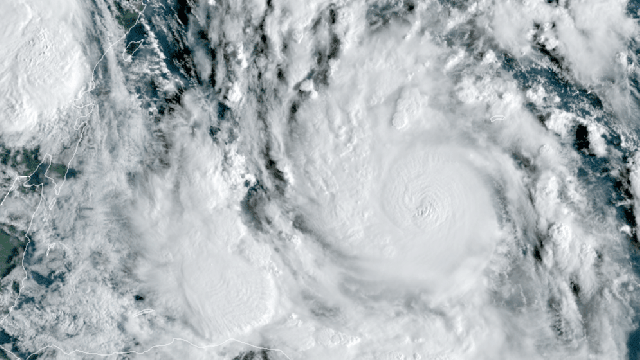There was one brief, beautiful week where Atlantic hurricane season let up after a staggering run of storms, and we could relax. That break is, unfortunately, over.
Hurricane Delta is shaping up to be an incredibly dangerous storm as it picks up steam in the Caribbean. At this time 24 hours ago, Delta had just reached weak tropical storm status. But the storm has since exploded, ramping up to a burly Category 2 hurricane as of Tuesday morning with more strengthening on the way. It could peak at a Category 4 as it nears the Gulf Coast on Friday, and anyone living in Louisiana should be on high alert.
As of Tuesday morning, the storm was packing winds of 185 km/h, making it a Category 3 storm. The National Hurricane Centre is expecting Delta to maintain major hurricane status over the next few days. That follows a shocking windspeed increase of 113 km/h over the past 24 hours, well above the threshold for rapid intensification. That’s the second-largest increase in windspeed over 24 hours ever recorded in the Atlantic in recent history, trailing only devastating Hurricane Wilma in 2005.
The immediate concern with Delta is what it means for the Yucatan Peninsula, which the NHC warned could face “extremely dangerous storm surge and hurricane conditions.” The storm is expected to make landfall on the northeast tip of the peninsula near Cancun or Playa del Carmen on Wednesday as a major hurricane. Hurricane Delta will deliver up to 2.7 metres of storm surge and 25cm of rain to the peninsula before moving over the open waters of the Gulf of Mexico. Abnormally warm waters there will feed the storm further.
The last storm to shoot the gap between Cuba and the Yucatan was 2018’s Hurricane Michael, which brought widespread destruction to the Florida Panhandle as a Category 5. Hurricane Delta’s track will be a little different as will its intensity. The storm is currently forecast to most likely make landfall in Louisiana on Friday or Saturday. The track could change, though, and Mississippi, Alabama, and part of the Florida Panhandle and Texas are also in the cone of probability in the latest NHC forecast.
Delta will thankfully hit a patch of cooler-than-normal waters off the coast of Louisiana, a remnant of the rapid firestorms of Hurricane Laura and Hurricane Sally that helped churn up that portion of the Gulf. As of now, the NHC forecast is calling for Delta to be a Category 1 or 2 at landfall in the U.S. Even if it’s not a monster Category 4 storm, Delta could still cause widespread damage, and if you live anywhere on the Gulf Coast, watch the forecast. Hurricane watches are almost certain to go up in the coming days for parts of the Gulf as Delta’s track becomes clearer.
The storm is, as so many have been, a record-setter for how early it formed. The 2020 Atlantic hurricane season dipped into the Greek alphabet after running out of storm names in mid-September. Delta marks the fourth letter of the Greek alphabet, which is used after the Latin alphabet is exhausted, and its appearance comes six weeks earlier than 2005’s Tropical Storm Delta, the former earliest Delta-named storm on record (excluding 1972’s Subtropical Storm Delta, which was before the NHC switched its naming conventions).
The early arrival of Delta this year has the season on track to break the record for most named storms by a wide margin. With 28 named storms, 2005 holds that distinction of the most-active season on record, but 2020 will almost certainly smash the record. There are still nearly two months of hurricane season left, and a La Niña just formed. That cooling of waters in the tropical Pacific can relax winds in the atmosphere over the Atlantic, allowing tropical storms and hurricanes to spin up more easily. And honestly, the way things have gone this year, I’m counting on a few storms to spin up after the season officially ends on November 30.
